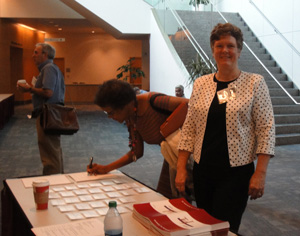Jan Chambers Speaks at NIH Workshop
NIH Workshop on Overlapping Conditions
Jan Chambers, president of the National Fibromyalgia & Chronic Pain Association, spoke on behalf of people with fibromyalgia and chronic pain at the standing-room only workshop August 13-14, 2012. Eight overlapping conditions were discussed: FM, TMD, VVD, IC, IBS, CFS, migraines, and endometriosis She said:
"Thank you for this most valuable workshop. Millions of people with fibromyalgia depend on our ability to communicate their needs for a better quality of life. We appreciate the opportunity to have the patient voice in the discussion. In answer to the question put to the leaders of the advocacy organizations, 'What would our patients want?' Jan responded:
 1. Scientific validation of the fibromyalgia diagnostic criteria.
1. Scientific validation of the fibromyalgia diagnostic criteria.
2. Education of healthcare providers that fibromyalgia is not a psychological illness but psychological tools are needed to help people cope with pain and symptoms.
3. Increasing scientific research: We know major steps are being taken to address this, but the current NIH system for funding pain research is broken. Most pain research is funded by the individual institute that is responsible for the area of the body that the pain affects, so NIDCR funds TMD research, NIAMS funds fibromyalgia, NIDDK funds IC/CP, etc. If cancer research, for example, was funded in the same manner, then each individual institute would be funding research on cancers in the area of the body they are responsible for, but there would be no cancer center devoted to studying the broader phenomenon of cancer. The NIH Pain Consortium is a good idea, in that it theoretically brings together different institutes that fund pain research, but it has been extremely ineffective in leading to funding for larger pain initiatives, by collating resources across institutes. The study of pain will not move forward unless the NIH funds a robust network of centers that are focused on the study of pain, rather than thinking that this will occur primarily with smaller grants (RO1s), or with the few funded NIH pain centers that are funded, which are all focused on studying a single pain condition - not the broader problem of chronic pain.
Thank you for caring and for considering our requests.






